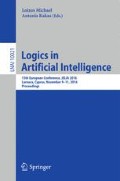Abstract
In this extended abstract, we discuss the use of iteratively-supported formulas (ISFs) as a basis for computing strongly-supported models for Kleene Answer Set Programs (ASP\(^{K}\)). ASP\(^{K}\) programs have a syntax identical to classical ASP programs. The semantics of ASP\(^{K}\) programs is based on the use of Kleene three-valued logic and strongly-supported models. For normal ASP\(^{K}\) programs, their strongly supported models are identical to classical answer sets using stable model semantics. For disjunctive ASP\(^{K}\) programs, the semantics weakens the minimality assumption resulting in a classical interpretation for disjunction. We use ISFs to characterize strongly-supported models and show that they are polynomially bounded.
Access this chapter
Tax calculation will be finalised at checkout
Purchases are for personal use only
References
Chan, P.: A possible world semantics for disjunctive databases. IEEE Trans. Knowl. Data Eng. 5(2), 282–292 (1993)
Doherty, P., Szałas, A.: Stability, supportedness, minimality and kleene answer set programs. In: Eiter, T., Strass, H., Truszczyński, M., Woltran, S. (eds.) Advances in Knowledge Representation. LNCS, vol. 9060, pp. 125–140. Springer, Heidelberg (2015)
Ferraris, P., Lifschitz, V.: On the minimality of stable models. In: Balduccini, M., Son, T.C. (eds.) Logic Programming, Knowledge Representation, and Nonmonotonic Reasoning. LNCS, vol. 6565, pp. 64–73. Springer, Heidelberg (2011)
Gebser, M., Kaufmann, B., Neumann, A., Schaub, T.: clasp: a conflict-driven answer set solver. In: Baral, C., Brewka, G., Schlipf, J. (eds.) LPNMR 2007. LNCS (LNAI), vol. 4483, pp. 260–265. Springer, Heidelberg (2007)
Gelfond, M., Kahl, Y.: Knowledge Representation, Reasoning, and the Design of Intelligent Agents -The Answer-Set Programming Approach. Cambridge University Press, Cambridge (2014)
Lee, J., Lifschitz, V.: Loop formulas for disjunctive logic programs. In: Palamidessi, C. (ed.) ICLP 2003. LNCS, vol. 2916, pp. 451–465. Springer, Heidelberg (2003)
Leone, N., Pfeifer, G., Faber, W., Eiter, T., Gottlob, G., Perri, S., Scarcello, F.: The DLV system for knowledge representation and reasoning. ACM Trans. Comput. Log. 7(3), 499–562 (2006)
Lierler, Y.: cmodels – SAT-based disjunctive answer set solver. In: Baral, C., Greco, G., Leone, N., Terracina, G. (eds.) LPNMR 2005. LNCS (LNAI), vol. 3662, pp. 447–451. Springer, Heidelberg (2005)
Lifschitz, V.: Thirteen definitions of a stable model. In: Blass, A., Dershowitz, N., Reisig, W. (eds.) Fields of Logic and Computation. LNCS, vol. 6300, pp. 488–503. Springer, Heidelberg (2010)
Lifschitz, V., Razborov, A.: Why are there so many loop formulas? ACM Trans. Comput. Log. 7(2), 261–268 (2006)
Lin, F., Zhao, J.: On tight logic programs and yet another translation from normal logic programs to propositional logic. In: Gottlob, G., Walsh, T. (eds.) Proceedings of the IJCAI-03, pp. 853–858. Morgan Kaufmann (2003)
Lin, F., Zhao, Y.: ASSAT: computing answer sets of a logic program by SAT solvers. Artif. Intell. 157(1–2), 115–137 (2004)
Liu, G., Janhunen, T., Niemelä, I.: Answer set programming via mixed integer programming. In: Brewka, G., T., E., McIlraith, S. (eds.) Proceedings of the KR 2012. AAAI Press (2012)
Pelov, N., Ternovska, E.: Reducing inductive definitions to propositional satisfiability. In: Gabbrielli, M., Gupta, G. (eds.) ICLP 2005. LNCS, vol. 3668, pp. 221–234. Springer, Heidelberg (2005)
Sakama, C., Inoue, K.: An alternative approach to the semantics of disjunctive logic programs and deductive databases. J. Autom. Reasoning 13(1), 145–172 (1994)
Simons, P., Niemelä, I., Soininen, T.: Extending and implementing the stable model semantics. Artif. Intell. 138(1–2), 181–234 (2002)
Soininen, T., Niemelä, I.: Developing a declarative rule language for applications in product configuration. In: Gupta, G. (ed.) PADL 1999. LNCS, vol. 1551, pp. 305–319. Springer, Heidelberg (1999)
Son, T., Pontelli, E.: A constructive semantic characterization of aggregates in answer set programming. TPLP 7(3), 355–375 (2007)
Acknowledgments
This work is partially supported by the Swedish Research Council (VR) Linnaeus Center CADICS, the ELLIIT network organization for Information and Communication Technology, the Swedish Foundation for Strategic Research (CUAS Project, SymbiKCloud Project), the EU FP7 project SHERPA (grant agreement 600958), and Vinnova NFFP6 Project 2013-01206.
Author information
Authors and Affiliations
Corresponding author
Editor information
Editors and Affiliations
Rights and permissions
Copyright information
© 2016 Springer International Publishing AG
About this paper
Cite this paper
Doherty, P., Kvarnström, J., Szałas, A. (2016). Iteratively-Supported Formulas and Strongly Supported Models for Kleene Answer Set Programs. In: Michael, L., Kakas, A. (eds) Logics in Artificial Intelligence. JELIA 2016. Lecture Notes in Computer Science(), vol 10021. Springer, Cham. https://doi.org/10.1007/978-3-319-48758-8_36
Download citation
DOI: https://doi.org/10.1007/978-3-319-48758-8_36
Published:
Publisher Name: Springer, Cham
Print ISBN: 978-3-319-48757-1
Online ISBN: 978-3-319-48758-8
eBook Packages: Computer ScienceComputer Science (R0)

